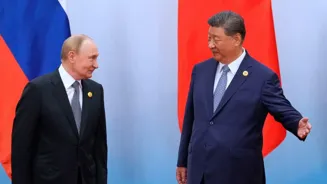It started as a candid moment between world leaders. As Chinese President Xi Jinping and Russian President Vladimir Putin walked toward a viewing platform during a military parade in Beijing, microphones
captured an unusual exchange. Via interpreters, the two were heard discussing the future of biotechnology and the prospect of living to 150 years old through organ transplants.
Their comments, which quickly went viral, sparked a broader question: Is there anything in today’s science that supports this idea, or were they simply speculating about a far-off future?
What Exactly Did Xi And Putin Say?
The moment took place at an event marking the 80th anniversary of Japan’s surrender in World War II. According to CNN, microphones picked up fragments of a conversation between Xi and Putin as they led other leaders to the viewing deck. Xi was heard saying in Mandarin: “Now people in their 70s are still young.” A Russian interpreter then translated: “Earlier, people rarely lived past 70, but these days at 70 years… still a child.”
Shortly afterwards, a Mandarin-speaking translator, reportedly relaying Putin’s words, said: “In a few years, with the development of biotechnology, human organs can be constantly transplanted so that [people] can live younger and younger, and even become immortal.”
Xi responded: “The prediction is that in this century humans may live to 150 years old.” Putin later confirmed to reporters that the conversation was about future medical breakthroughs and life expectancy improvements.
While the remarks appeared casual, the reference to repeat organ transplantation and biological rejuvenation touched on themes that are currently being explored by scientists, albeit with far more modest goals.
Is There Any Precedent For Organ Transplants Significantly Extending Life?
Modern transplant medicine has extended lives, but it does not offer a pathway to extreme longevity. Organ transplants are primarily a response to end-stage organ failure, not a means of reversing the ageing process or prolonging life to 150 years.
According to the BBC, the typical lifespan of transplanted organs is well understood:
- A kidney from a living donor may last 20 to 25 years
- A kidney from a deceased donor: 15 to 20 years
- Liver: around 20 years
- Heart: approximately 15 years
- Lungs: under 10 years
Immunosuppressant medication, necessary to prevent the body from rejecting the transplanted organ, must be taken for life and brings its own complications. Side effects include increased vulnerability to infections and other health risks. While some patients live decades post-transplant, these cases remain exceptions, not indicators of unlimited biological extension.
Could Multiple Organ Transplants Be The Key To Extreme Longevity?
In theory, replacing failing organs repeatedly could extend lifespan, but in practice, the limits of the human body make this an unlikely strategy.
BBC cited Professor Neil Mabbott of the University of Edinburgh, who noted that while replacing individual organs is possible, undergoing multiple transplant surgeries, especially at an advanced age, would place overwhelming stress on the body.
He pointed out that ageing affects more than just individual organs. The immune system, connective tissues, and recovery capacity all decline over time. Even if a heart or liver could be replaced, the rest of the body continues to age.
Mabbott argued that the combined trauma of surgery and long-term immunosuppressant use would be too severe for elderly patients.
Are Scientists Trying To Develop Organs That Won’t Be Rejected?
To address one of the biggest hurdles in transplant medicine, organ rejection, researchers are working on alternatives that don’t rely on traditional human donors. One such field is xenotransplantation, which involves transplanting organs from animals, typically genetically modified pigs, into humans.
As per the BBC, scientists are using CRISPR gene-editing technology to remove certain pig genes and insert human ones, in an attempt to make the organs more immunologically compatible. Pig organs are considered ideal because of their similar size and function.
However, this field is still in its infancy. So far, only a handful of xenotransplants have taken place, including a pig heart and a pig kidney, and both patients died after the procedure. The experiments contributed valuable data, but fell short of proving long-term viability. These results highlight the highly experimental nature of the science, even if the long-term goal is a world where rejection-free organs are readily available.
What About Growing Organs From Human Stem Cells?
Beyond animal organs, scientists are also exploring whether human tissues can be grown in the lab using stem cells. These cells have the potential to transform into any tissue type and could one day allow for the creation of personalised, rejection-free organs.
In 2020, researchers at University College London and the Francis Crick Institute successfully rebuilt a human thymus using stem cells and a bioengineered scaffold. When transplanted into mice, the organ appeared to function normally.
Separately, scientists at Great Ormond Street Hospital have grown intestinal grafts from patient tissue for use in children with intestinal failure. These developments mark early progress in the field of regenerative medicine.
However, no fully functional, transplant-ready organ grown from human stem cells has yet been developed for adult patients. The work is promising but still experimental and limited to early-stage applications.
Are Other Anti-Ageing Techniques Being Explored?
Organ transplantation is just one part of the broader longevity conversation. Other interventions, including plasma transfusions and cellular rejuvenation, have also attracted interest.
Entrepreneur Bryan Johnson, for example, attempted to reduce his biological age by infusing himself with plasma from his teenage son. He later stopped the practice after seeing no measurable benefits and facing scrutiny.
Beyond individual experiments, researchers are examining whether these and similar interventions, such as plasma replacement therapy or cellular reprogramming, might slow ageing at the cellular level.
Dr Julian Mutz of King’s College London told the BBC that such strategies are still experimental, and there is limited evidence that they can impact maximum lifespan. While scientific interest is growing, practical applications remain distant.
What Do Transplant Experts Say About Living To 150?
Despite ongoing research, the scientific consensus remains unchanged: organ transplants do not currently offer a pathway to extreme longevity.
Dr James Markmann, President of the American Society of Transplant Surgeons Executive Council, told Fox News: “There is no scientific evidence that [organ transplants] promote immortality, nor that humans could realistically reach 150 years of age through transplants.”
Markmann stressed that transplantation is a life-saving intervention, not a tool for radically extending the natural human lifespan.
Putin’s Interest In Longevity Research
The viral exchange in Beijing wasn’t entirely out of character, at least for Putin. According to Fox News, he has publicly supported longevity-related research. In 2024, he launched a state-funded initiative focused on cellular rejuvenation, neurotechnology, and organ regeneration. His daughter, endocrinologist Maria Vorontsova, has also received government grants for genetics and cell renewal studies.
Could Xi And Putin Be Onto Something?
Their remarks may have sounded speculative, but the themes they touched on, from organ regeneration to the use of biotechnology in extending human life, are rooted in ongoing scientific efforts around the world.
Still, as of today, there is no evidence that any of these efforts can support the idea of humans living to 150. Most interventions are focused on treating disease, not defying the fundamental limits of biology.
Jeanne Calment, who lived to 122, remains the oldest confirmed human in history. Many scientists believe that 125 is close to the upper boundary of the natural human lifespan. Transplants and biotech may one day help more people reach that limit in good health, but there is no current indication that they can push it much further.
In the end, the question Xi and Putin raised is scientifically relevant, but still decades away from any meaningful answer.














